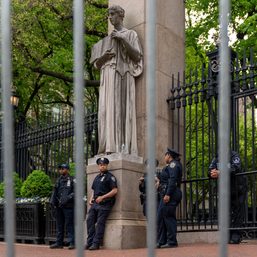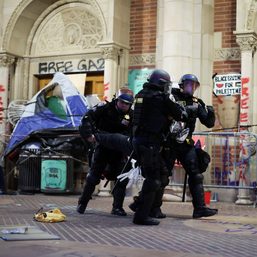SUMMARY
This is AI generated summarization, which may have errors. For context, always refer to the full article.
![[OPINION] A rebellion long overdue](https://www.rappler.com/tachyon/2024/06/mass-uprising-matrix-june-4-2024.jpg)
A few months before the coronavirus shut down the world, Chile exploded against neoliberalism. A World Bank economist, Sebastian Edwards, was on the ground to record the rebellion:
On Oct 18, 2019, and to the surprise of most observers, massive protests erupted throughout the country. Demonstrations were triggered by a small increase in metro fares – thirty pesos, or the equivalent of four cents of a dollar. But the rallies were about much more than the fare increase. Hundreds of thousands of people marched in several cities and demonstrated against the elites, corporate abuse, greed, for-profit schools, low pensions, and the neoliberal model. Demonstrators asked for debt forgiveness for students and free universal health services.
In 2021, an anti-neoliberal president, Gabriel Boric was elected president, and neoliberal policies are now being rolled back in that country, though in the teeth of strong opposition from the local elite, technocrats, foreign investors, and the multilateral agencies.
So the obvious next question: why, despite its obvious failures, has neoliberalism not provoked a similar rebellion here?
Psychosis of economic managers
One thing I can say is that it’s long overdue.
After 45 years, we are an economic wasteland, except in the eyes of our elites and technocrats. The poverty rate stands at 25% of the population, despite efforts to doctor the statistics. The gini coefficient, which measures inequality, is at .50, one of the highest in the global South.
Owing to our economic managers’ push during the Ramos presidency to bring down tariffs on imports to 5% or less, our manufacturing is nearly gone. Elimination of quotas on agricultural imports, including rice, as demanded by the World Trade Organization, has led to nearly all our key agricultural lines being dominated by imports, mainly from the US and the European Union. With manufacturing dead, agriculture dying, Business Processing Operations and services unable to generate a significant number of new jobs domestically, our work force is left to scurrying abroad in search of decent, non-dead-end jobs. Without the $37 billion in remittances they send back annually, the economy would be dead in the water.
If it were just a case of objectively documenting the devastating impact of neoliberal policies, our side won the battle as early as the 2000’s. There was even a finance secretary who admitted that there’s “an uneven implementation of trade liberalization…which has killed so many local industries.” He was ignored. The list of industrial casualties included paper products, textiles, garments, ceramics, rubber products, furniture and fixtures, petrochemicals, wood, and petroleum oils. It did not matter.
Disregarding the facts, the neoliberal machine ground on. Under Duterte, the rice quota was eliminated in favor of “rice tariffication,” the foreign investment act was liberalized, and retail trade was further opened up to foreign investors. Under President Ferdinand Marcos Jr. and his cousin, Speaker Martin Romualdez, there is again the perennial push by the neolibs to eliminate the nationalist provisions of the 1987 Constitution in order to make reversal of 45 years of neoliberal initiatives impossible.
Albert Einstein’s defined insanity as doing the same thing over and over and expecting different results. What better description is there of the psychosis that has our economic managers in its grip?
The Matrix
Neoliberalism seems impermeable to the facts. The theory is that markets are efficient, and privatization, deregulation, and liberalization will bring about the best of all possible worlds, so if the facts don’t fit the theory, so much the worse for the facts. The image that has haunted me is one from the movie The Matrix, where human beings are plugged to a system which has them dreaming of a pleasant alternate reality while their bodies are being sucked off of the nutrients and energy to feed alien beings.
So if reason and the facts are on our side, why have we not been able to unplug Filipinos from the Neoliberal Matrix? Why has neoliberalism become so “naturalized,” or seen as the natural order of things? My colleagues and I have pointed to a number of reasons.
Neoliberal hegemony
First, for a long time, corruption, especially in the form of crony capitalism under Marcos Sr. was seen as the main reason for the underdevelopment of the country, and, with its emphasis on the market instead of politics as the driver of the economy, neoliberalism was seen as an “antidote” to corruption.
Second, neoliberalism was not simply an external imposition. It was internalized by a whole generation of Filipino economists and technocrats who studied in US universities or worked at the World Bank and International Monetary Fund at a time that Keynesianism had been displaced as the reigning economic paradigm, its credibility undermined by its failure to address the stagflation that hit western economies in the 1970s. With its worship of the market, neoliberal ideology became synonymous with economics.
Third, the country’s elites were unified in support of neoliberalism, with no “national bourgeoisie” around to break the consensus. Their support could be counted on so long as neoliberal policies did not include initiatives to demonopolize the sectors these elites dominated, such as land, real estate, and banking and finance. Neoliberal measures were mainly focused on tariff reform, weakening labor, deregulation, and privatization, so the oligarchy found them non-threatening. And, of course, those sectors of the economic elite that were dependent on foreign capital were all for more investment liberalization.
Fourth, it was only in the mid-1990’s that the developmental state model, which attributed a central role to the state in the success of Japan, South Korea, and Taiwan, offered an powerful alternative paradigm, But being mainly advanced by political scientists, like Chalmers Johnson or Alice Amsden, it did not register in the line of vision of Filipino technocrats and economists in ideological thrall to the neoliberal orthodoxy.
But are these reasons enough to explain the failure of our critique to connect with the people? There seems to have been a bigger explanation, and that is, our side was debating on the basis of facts and rationality, whereas our antagonists, like Cielito Habito, Jesus Estanislao, and Carlos Dominguez were coming from a stance of faith and revelation, with their revealed truth being the Friedrich Hayek-Milton Friedman Bible. It was the old Reason versus Revelation debate, but in a secular guise.
Seattle and the primacy of action
In thinking about how to get out of this conundrum, I remembered how the events in Seattle in December 1999 that broke the global elite consensus around globalization and neoliberalism might have some lessons for us.
In the decade prior to Seattle, there were a lot of studies, including UN reports, that questioned the claim that globalization and free market policies were leading to sustained growth and prosperity. However, these figures remained “factoids” rather than facts in the eyes of academics, the press, and policymakers, who dutifully repeated the neoliberal mantra that economic liberalization promoted growth and prosperity.
Then came Seattle. After those tumultuous days, the press began to talk about the “dark side of globalization,” about the inequalities and poverty being created by globalization. After that, we had the spectacular defections from the camp of neoliberal globalization, such as those of the financier George Soros, the Nobel laureate Joseph Stiglitz, the star economist Jeffery Sachs, and many others.
What made the difference? Not so much research or debate but action. It took the anti-globalization actions of masses of people in the streets of Seattle – which interacted in synergistic fashion with the resistance of developing country representatives in the Sheraton Convention Center and a police riot, to bring about the spectacular collapse of a WTO ministerial meeting – to translate factoids into facts, into truth.
Seattle’s enduring lesson is that truth is not just out there, existing objectively and eternally. Truth is completed, made real, and ratified by action.
Facts not enough: Challenge to Gen Z
As in Seattle, theoretical debate was important in Chile, but it was mass action that made the difference in weakening the hold of neoliberalism. The 2019 Uprising had its roots in the massive protests against the privatization of the educational system in 2006, which saw the participation of hundreds of thousands of high school students. The Chilean millennials then took that spirit of rebellion to other areas, like transport, industry, the mines, and social security over the next 13 years.
Political mobilization in disparate areas were brought together under the slogan of ending neoliberalism. It was an approach that demanded not the repeal of specific neoliberal policies, but the dismantling of the whole neoliberal paradigm governing the economy. By 2019, the situation was ripe for revolt, and one of the leaders of the mass uprising was a millennial, Gabriel Boric, who would be elected president in 2021, at the age of 36.
Our side has the arguments and the facts, which is why neoliberal economists and technocrats have consistently refused to engage us in debate. But facts are not enough. Facts need a mass movement to convert them into truth. That is the lesson of Seattle and Chile.
With my generation and that of our Millennials having failed in this task, will Gen Z assume the role of Neo, the hacker played by Keanu Reeves, and lead the effort to unplug our people from the Matrix? – Rappler.com
Walden Bello is principal author of the book The Anti-Developmental State: The Political Economy of Permanent Crisis in the Philippines (Quezon City: University of the Philippines Press, 2004).
1 comment
How does this make you feel?
![[In This Economy] PH poverty dropped in 2023. But it’s too damn slow.](https://www.rappler.com/tachyon/2024/01/TL-poverty-jan-5-2024.jpg?fit=449%2C449)


![[In This Economy] Part 2 | POGOnomics: Are we banning POGOs out of fear, outrage, not rational thought?](https://www.rappler.com/tachyon/2024/06/thought-leaders-pogonomics-part-2b.jpg?resize=257%2C257&crop=292px%2C0px%2C720px%2C720px)
![[In This Economy] POGOnomics: Weighing the costs and benefits of POGOs](https://www.rappler.com/tachyon/2024/06/thought-leaders-pogonomics-part-1.jpg?resize=257%2C257&crop=279px%2C0px%2C720px%2C720px)

![[EDITORIAL] Manigong Bagong Taon? Puwede na ang ‘masayang’ bagong taon](https://www.rappler.com/tachyon/2024/01/animated-2024-fearless-forecast-carousel.jpg?resize=257%2C257&crop_strategy=attention)
![[OPINION] The politics of rice – and managing perception](https://www.rappler.com/tachyon/2023/09/politics-rice-september-14-2023.jpg?resize=257%2C257&crop_strategy=attention)
![[EDITORIAL] Insulto si Gadon sa maralita, propesyonal, at burukrasya](https://www.rappler.com/tachyon/2023/07/animated-gadon-disbarment-appointment-carousel.jpg?resize=257%2C257&crop_strategy=attention)




Thanks to Prof. Walden Bello for his inspiring and educational article, “A rebellion long overdue.” I’m really intrigued: What is the specific name of the movement or rebellion he refers to? Secondly, I’m eagerly looking forward to his next article about how to plan and execute the said movement or rebellion. Thirdly and lastly, to the statement that “my generation and that of our Millennials having failed in this task,” this phrase may be added: “but my generation and the Millennials are willing to do it again under a new leadership, ideology, economic theory, and action plan.”